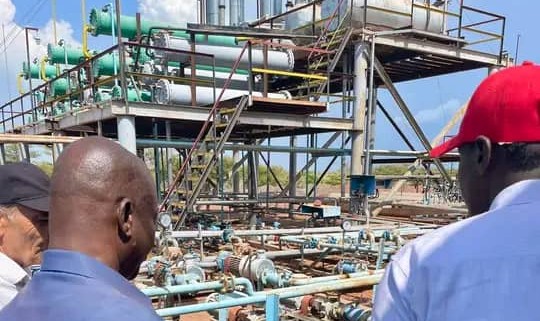
South Sudan’s oil industry, once a beacon of hope for economic growth, remains entangled in political instability, corruption, and unresolved conflicts, according to the country’s prominent activist.
The remarks came following a recent inspection of the Unity State Oil Refinery by the Vice President and Chair of the Infrastructure Cluster, Taban Deng Gai, which has brought renewed attention to a project that could have significantly influenced fuel prices in the country.
Built to produce 10,000 barrels per day, the Bentiu Oil Refinery was envisioned as a crucial step toward economic recovery. However, years of violence and misgovernance have rendered its operations stagnant.
Activist Edmund Yakani, Executive Director of Community Empowerment for Progress Organisation (CEPO), acknowledged the Vice President’s efforts in visiting the site but pointed to deeper systemic challenges that have hindered the refinery’s progress.
He emphasized that armed violence, which has persisted since 2013, is the primary obstacle, placing the blame squarely on South Sudan’s political and military leaders.
“The great challenge for operationalizing the refinery is the consistent occurrence of armed violence since 2013 in the country, which is an act that our political and gun class to be blamed for without any excuse,” said Yakani
South Sudan’s economy, heavily reliant on oil revenues, has suffered under rampant corruption and mismanagement, with Yakani warning that economic conditions will remain unfavorable for citizens until meaningful reforms are enforced.
“South Sudan’s economy will continue to be unfit for the best interest of the citizens because of the high level of corruption in all forms perpetrated by the leaders (key decision makers) at all levels of the government.” He stated, adding that the high level of corruption across all government levels has prevented the economy from serving the best interests of the people.
The Bentiu Refinery now stands as a symbol of stalled progress, much like the ambitious plan to construct a new city in Lakes State, which has failed to materialize. Yakani noted that both projects have become stories without results, illustrating a broader trend of failed initiatives in the country.
Experts believe that South Sudan’s resource wealth could provide significant economic benefits, but only if conflict is resolved through dialogue rather than violence as believed by many who pressed on political elites to shift away from ethnic-driven hostility and distrust.
“As long as leaders continue to harbor these attitudes, economic progress will remain out of reach.”
In a final appeal to the country’s leadership, CEPO urged politicians to embrace dialogue as a strategy for addressing differences and restoring national confidence, highlighting that political indiscipline and immaturity have contributed to ongoing violence.
For South Sudan, the Bentiu Oil Refinery is more than just an industrial project, it is a reflection of broader political and economic dysfunction. Without decisive reforms, the nation risks continuing down a path where its potential remains unrealized, leaving millions of citizens in economic distress.

